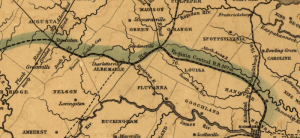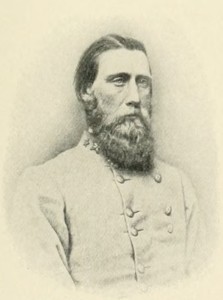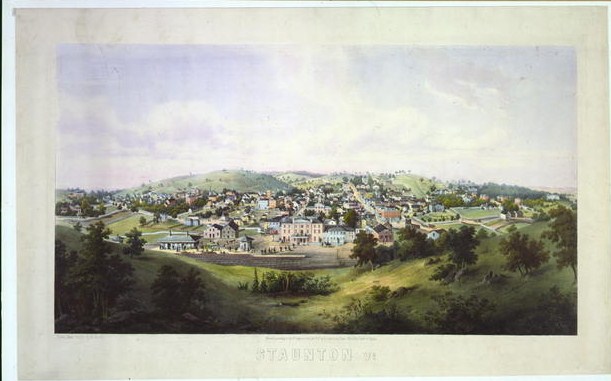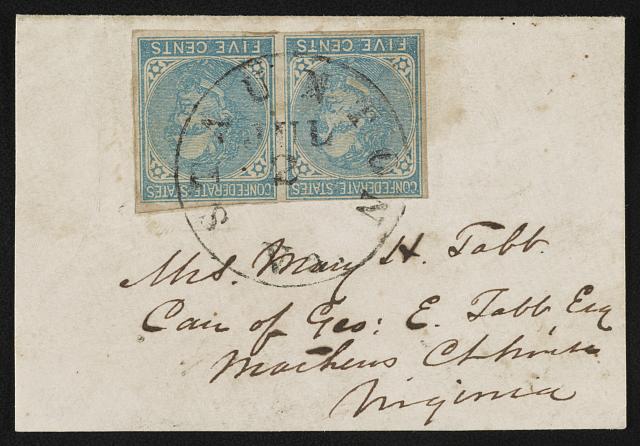I was a bit surprised that the Richmond paper could publish a letter the day after it was written. Apparently the Virginia Central Railroad was in fine feather 150 years ago this week. Massachuset describes the wounded thronging to the relative safety of Staunton.
From the Richmond Daily Dispatch July 29, 1863:
Letter from Staunton.
[Correspondence of the Richmond Dispatch.]
Staunton, July 28, 1863.
For some days this place has presented a scene of sad confusion which at once invites and defies description. Long ambulance trains have blocked the streets, and longer lines of sick and wounded men weary and footsore from their walk of over a hundred miles, have thronged the sidewalks, while meeting this incoming stream has printed forth a current of new life for the army in the shape of restored men and recruits going to join their respective commands. Added to this, there have been commissary trains, and trains, and ordnance trains, and ever and about worming its way through the confusion has the hearse ambulance, with chaplain and escort, beating [bearing?] sometimes as many as three soldiers to their last resting place.–The town pump, during these sad days — which have also been for this mountain town very hot days — has been constantly surrounded by the soldiers, and just I have seen them from morning till night, working its iron handle and bearing its iron ladle to their thirsty lips, or holding their wounded limbs under its never failing stream, I have felt I would rather be the author of that pump than of a good poem Doubtless its cool, clear water has not only refreshed many a weary body, but caused many a heart to feel tender as he thought of the spring or pump or well of his childhood — of “the old iron bucket that hung in the well.–Let us hope that not a few felt thankful to the Great Giver as they their thirst or bathed their wounds.
For a day or two, the excitement was enhanced by the crossing of the main body of our army over the Blue Ridge. Refugees have been arriving from the Lower Valley, and the hospitals at Mr. Jackson and Winchester have hurriedly implied themselves here. Only 106 men, too bad to move, have been left at the latter place. In consequence, the arrivals over flowed our hospitals, and far exceeded the means of transportation, and yesterday all the churches and halls of the town were thrown open to receive the sick and wounded, and every means was resorted to [ to ] give them food. In a few days, we may expect Staunton will be a more quiet place. But I am not so sure that the Lower Valley is to be so soon evacuated. I heard yesterday that a force of cavalry and artillery had gone to dispute its possession with the enemy.–I have been informed that two divisions of Ewell’s corps came up to New Market quite hurriedly. They were still below Winchester when it was ascertained that the enemy in force were at Front Royal, and therefore had the shorter route to Strasburg.
I learn that the committees from Richmond and other places have been very efficient in ministering to our suffering soldiers. They have just passed through here, returning to their homes. Drs. Broaddus, Burrows, Hoge, and Wilmer, have also just passed through, en route from Winchester.
Gen. Hood is pleasantly quartered about a mile from town, at Mr. Jeff Kenny’s. He is recovering rapidly, and is in fine spirits, and says he hopes to be in the next fight.
I rode with a friend, the other day, over the soldiers’ grave-yard, situated half a mile west of the town, on a commanding hill. The faithful old sexton, who keeps a careful register, which enables him to identify every grave, told me there had been over twelve hundred interment, and that nearly a hundred bodies had been disinterred. I could not help thinking how desirable, “after the war,” to rear a monument on this lofty hill, commanding a view both of the Blue Ridge and the Alleghany, in honor of the braves who here rest well. Glad was I to be informed that such a plan was already in the minds of the managers of the Thornrose cometary.
Massachuset.
John Bell Hood’s left arm was severely wounded on the second day at Gettysburg. Wikipedia has him recuperating in Richmond by sometime in August 1863. You can read more about Gettysburg and all of the general’s work with the Army of Northern Virginia at the John Bell Hood site
Massachuset is an interesting pen name. Massachusetts was one of the more vehement abolition states; on the other hand, the Massachuset people were severely weakened by European disease and rival tribes.




